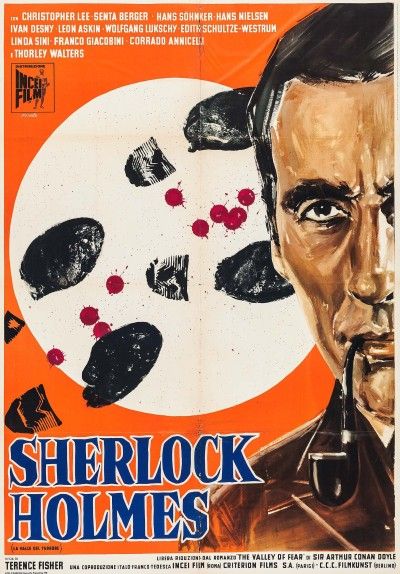
Rating: B-
Dir: Terence Fisher
Star: Christopher Lee, Thorley Walters, Hans Söhnker, Hans Nielsen
a.k.a. Sherlock Holmes und das Halsband des Todes
I was intrigued by the concept of Hammer stalwart Fisher, going over to Germany and directing Dracula in the role of the great detective. Three years earlier, he had made The Hound of the Baskervilles with Lee – though the actor played Sir Henry Baskerville there, with Peter Cushing as Holmes. The German production was intended as the first in a franchise, perhaps along the lines of the Edgar Wallace krimis. However, it never happened, perhaps due to the Conan Doyle estate being unreasonable. They rejected the studio’s plan to set the series in the present era, and forced frequent reshoots. It would be understandable if the producers couldn’t be bothered with all the hassle.
This was very loosely based on the Arthur Conan Doyle novel, The Valley of Fear, and pits Holmes (Lee) and Watson (Walters) against regular nemesis Professor Moriarty (Söhnker). The problem is, to a regular eye – and Scotland Yard’s Inspector Cooper (Nielsen) in particular – Moriarty appears a respectable academic. Holmes needs to acquire enough evidence to prove otherwise, and has been using his skills in disguise to keep an eye on his nemesis. When two ex-convicts return from Egypt, and an informant turns up fatally stabbed on the steps of 221B Baker Street, Sherlock uncovers a plan by Moriarty. The master criminal intends to locate and steal a necklace, reputed to have belonged to Cleopatra. It was stolen from a dig and brought back to England six years ago.
 The main issue is probably the dubbing. While the audio was post-synched like most German productions of the time, the English language version replaces Lee’s sonorous tones with a blandly generic voice actor. For anyone else, it might have worked; not with an actor who is so recognizable when he speaks. This misstep weakens a performance of which Lee was quite proud, calling it “one of the best things I’ve ever done, because I tried to play him really as he was written.” Though neither he nor the director had kind words to say about the overall end product. Equally ineffective is the period atmosphere, not least because the makers seem uncertain in what era the film is actually taking place. Composer Martin Slavin especially, whose jazz score seems to have wandered in from a different century.
The main issue is probably the dubbing. While the audio was post-synched like most German productions of the time, the English language version replaces Lee’s sonorous tones with a blandly generic voice actor. For anyone else, it might have worked; not with an actor who is so recognizable when he speaks. This misstep weakens a performance of which Lee was quite proud, calling it “one of the best things I’ve ever done, because I tried to play him really as he was written.” Though neither he nor the director had kind words to say about the overall end product. Equally ineffective is the period atmosphere, not least because the makers seem uncertain in what era the film is actually taking place. Composer Martin Slavin especially, whose jazz score seems to have wandered in from a different century.
On the other hand, I found myself inordinately amused by Sherlock actually telling his sidekick, “Elementary, my dear Watson!” The line has become such a cliché it basically never appears. I enjoyed the plot greatly, which sees Holmes and Moriarty sparring back and forth intellectually, and it feels like they’re a match. There is an obvious respect for each other – Moriarty at one point tries to hire the great detective. But Holmes is having none of it, and after foiling the robbery, calls in Moriarty to authenticate the necklace he was trying to steal. It’s a final twist of the knife, though naturally, Moriarty escape to crime another day, in those sequels that didn’t happen. A bit of a shame, I’d say.
